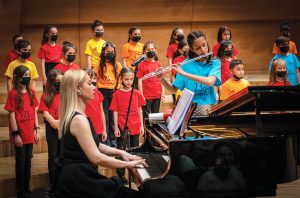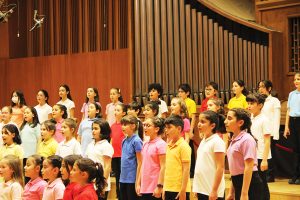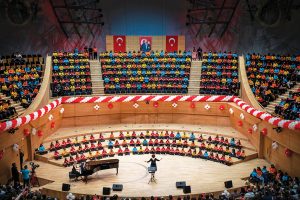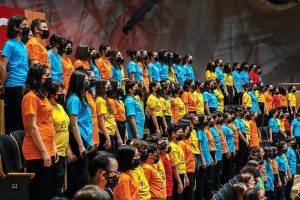Ein kurzer Überblick über die Entwicklung der Kinder- und Jugendchöre in der Türkei
Dr. Atilla Çağdaş Değer, Pädagoge und Chorleiter, Türkei
Die “Verwestlichung” des Osmanischen Reiches, die 1826 begann, legte einige Grundlagen für die Chormusik vor der Republik, aber diese Entwicklungen waren auf den Palast und seine Umgebung beschränkt. Wirkliche Fortschritte wurden mit der Gründung der Türkischen Republik und ihrer Politik der “Modernisierung” erzielt.
Faik Canselen, Erdoğan Okyay, Saip Egüz, Ziya Aydıntan und wegweisende Pädagogen-Komponisten wie Hikmet Şimşek, Muzaffer Arkan, Muammer Sun und Cenan Akın legten den Grundstein für Kinder- und Jugendchöre in der Türkei.
Der erste Theoretiker der türkischen Chormusik, der Komponist, Pädagoge und Musikwissenschaftler Ahmed Adnan Saygun, stellte fest, dass die Chorarbeit der preiswerteste und schnellste Weg der Erziehung im Musikleben des Volkes ist und dass jeder singen kann und dass dies durch Erziehung entwickelt werden kann (Adnan: 1940: S.13-19).
Die erste vom Staat finanzierte Kinder- und Jugendchorbewegung in der Türkei wurde am 19. Juni 1968 mit der “Anleitung für Kinder- und Jugendchöre” unter der Leitung von Muammer Sun, einem Berater des Ministeriums für nationale Bildung, ins Leben gerufen (Sun, 1969: S. 227).

Dieses sowohl von seinem historischen Wert als auch von seinem Inhalt her revolutionäre Dokument besteht aus sieben Kapiteln, in denen die Einrichtung von Kinder- und Jugendchören geregelt wird. Nach Sun (1969: S. 220) waren die Provinzdirektionen für Nationale Bildung im Auftrag des Ministeriums für Nationale Bildung für die Gründung, den Betrieb, die Konzerte, die Entwicklung und die Erfüllung der Bedürfnisse der Chöre zuständig. Geplant war, dass landesweit 80 Kinderchöre und 80 Jugendchöre gegründet werden sollten, dass jeder Chor mindestens zwei Konzertprogramme pro Jahr vorbereiten sollte und dass mindestens 320 Konzertprogramme in einer Reihe von Konzerten in Schulen, Hallen, im Freien, für Studenten und die Öffentlichkeit in mindestens 10 Konzerten präsentiert werden sollten. Im akademischen Jahr 1968-1969 wurden in vielen Provinzen und Bezirken 166 Kinder- und Jugendchöre gegründet, die entsprechend den gesetzten Zielen arbeiteten und Konzerte gaben. Für die Leiter der Chöre wurden zwei Fortbildungen organisiert, die erste in Ankara (1968) und die zweite in Sinop (1969). Die erste nationale Chorbewegung unseres Landes, die mit viel Mühe und Hingabe realisiert wurde und große Hoffnungen für die Zukunft aufkeimen ließ, wurde nach zwei Jahren eingestellt. (Değer, 2012: S. 27)
Der Komponist und Pädagoge Cenan Akın gründete 1975 den Akbank-Kinderchor, den ersten privatwirtschaftlichen Kinderchor in der Türkei. Über diesen Chor wurden erstmals Komponisten beauftragt, Kinderlieder zu schreiben, ein Wettbewerb wurde zu diesem Zweck ausgeschrieben, und die in einem Buch veröffentlichten Lieder wurden von der Akbank auf Empfehlung des Ministeriums für nationale Bildung kostenlos an Schulen verteilt (İlyasoğlu, 2007: S.130, Akbank, 1979: S. 3).

Bis zum Ende der 1970er Jahre wurden die pädagogischen und sozialen Grundlagen für die Gründung der TRT-Kinderchöre (Turkish Radio Television) geschaffen, die heute den größten und beständigsten Platz unter den Kinderchören in unserem Land einnehmen. Die Gründung der TRT-Kinderchöre begann im Jahr 1977, und danach wurden weitere Kinderchöre in der ganzen Türkei gegründet.
Bis in die 1980er Jahre gab es nur sehr wenige “Jugendchöre”, die durch Chorunterricht in Musikschulen und/oder durch die Initiative idealistischer Chorleiter entstanden. Der erste Versuch, Jugendchöre mit landesweiter Wirkung zu gründen, war jedoch der TRT Ankara Radio Youth Choir unter der Leitung von Chorleiter Mustafa Apaydın und der TRT Istanbul Radio Youth Choir unter der Leitung von Chorleiter Gökçen Koray im Jahr 1983. Der TRT Izmir Radio Youth Choir wurde 1985 gegründet.
Dank des staatlichen Rundfunkmonopols, insbesondere bis Anfang der 1990er Jahre, hörten nicht nur Kinder, sondern fast alle Türken Kinderlieder, Volkslieder, Märsche und verschiedene Chorwerke für Kinder- und Jugendchöre. Einer der wichtigsten Beiträge der TRT-Kinder- und Jugendchöre zur Musikerziehung besteht darin, dass sie angehende Musikpädagogen ermutigten, Kinder- und Jugendchöre zu gründen. Einige der Mitglieder dieser Chöre haben auch den Ursprung der Jugendchöre in Nichtstaatlichen Organisationen gebildet.

1983 wurde der Kinderchor der Staatsoper und des Balletts Ankara unter der Leitung von Sevim Ünal und Saadettin Ünal gegründet. Derselbe Chor wurde mit einem vom Kulturministerium am 15. November 1990 unterzeichneten Protokoll in Staatlicher Polyphoner Kinderchor innerhalb des Staatlichen Polyphonen Chors Ankara umbenannt (Yüksel, 1996: S. 40). Der 1989 unter der Leitung des Dirigenten des TRT-Ankara-Jugendchors, Mustafa Apaydın, gegründete Verband der Türkischen Polyphonen Chöre (TPKD) organisiert das Festival der Chöre der Türkei, die älteste nationale Chorveranstaltung der Türkei.
Im Jahr 1994 wurde der “Akyurt-Kinderchor” im Rahmen des Projekts der Sevda-Cenap And Music Foundation gegründet, um “die Musikerziehung in jungen Jahren zu initiieren und zu popularisieren“.
Der 1999 gegründete Verband der Musikpädagogen (MÜZED) ist die am weitesten verbreitete und einzige Berufsorganisation, die Chören in der Musikerziehung besondere Bedeutung beimisst und mit ihren Mitgliedern an der Entwicklung und Verbreitung der Chorerziehung arbeitet.
Die zweite nationale Chororganisation in der Türkei wurde im Jahr 2001 vom Kulturministerium unter der Leitung des Pädagogen und Komponisten Salih Aydoğan ins Leben gerufen. Im Rahmen des Projekts “Ein Chor für jede Provinz, ein Lied für jedes Kind” wurden zwischen 2001 und 2003 in 29 Provinzen Kinder- und Jugendchöre gegründet. Das Kulturministerium organisierte für die Leiter dieser Chöre Chorschulungs- und Managementseminare in Ankara (2001) und Antalya (2002).
1968 stellte das Bildungsministerium und 2001 das Kulturministerium die Arbeit ein, die unter der Schirmherrschaft des Bildungsministeriums bzw. des Kulturministeriums begonnen hatte.

Die Chormusik, insbesondere Kinder- und Jugendchöre, hat sich in den 2000er Jahren vor allem durch individuelle Bemühungen und die intensive Arbeit von Universitäten und Nichtstaatlichen Organisationen verbreitet.
Man kann sagen, dass die Chortradition sich von den großen Städten wie Ankara, Istanbul und Izmir in die Türkei ausgebreitet hat. Obwohl es in fast allen Städten des Landes Gymnasien für bildende Künste und in den meisten von ihnen Musikhochschulen gibt, ist die Zahl der Chöre im Vergleich zur Bevölkerungszahl sehr gering. Einer der wichtigsten Gründe dafür ist das Fehlen von Ausbildungsprogrammen an Musikschulen, um qualifizierte Chorleiter auszubilden. Weitere Probleme sind die fehlende Unterstützung für die Chöre, die ihre Arbeit fortsetzen, wie Probenräume, Konzertmöglichkeiten usw., und die Tatsache, dass Chorleitung nicht als Beruf anerkannt ist. Trotz all dieser negativen Umstände ist es eine Tatsache, dass in den 2000er Jahren, als sich Kommunikationsmöglichkeiten wie das Internet, soziale Medien usw. entwickelten und verbreiteten, die Zahl der Kinder- und Jugendchöre in der Türkei zunahm, mehr Kinder und Jugendliche Interesse an Chören zeigten, viele Musikstudenten sich für Chorleitung interessierten und dieses Interesse von Tag zu Tag wächst.
 Dr. Atilla Çağdaş Değer begann seine musikalische Ausbildung mit dem Singen in Amateur-Jugendchören. Er absolvierte ein Bachelorstudium an der Bilkent Universität im Fach Musik und Darstellende Künste, Abteilung Chor, sowie ein Masterstudium mit anschließendem Doktorat an der Gazi Universität am Institut für Erziehungswissenschaften im Fachbereich Kunst- und Musikerziehung. Er arbeitete als Lehrbeauftragter an beiden Institutionen. Seit 1998 ist er als ehrenamtlicher Musikpädagoge in zahlreichen Projekten tätig, gründete zahlreiche Chöre unterschiedlicher Art und unterstützte die Ausbildung junger Chorleiter. Seit 2006 unterrichtet er Solfège, Theorie und Gehörbildung und Chor am staatlichen Konservatorium der Hacettepe Universität Ankara. Nach dem Grundsatz „Musikerziehung für alle“ führt er Studien durch für Kinder, Jugendliche, Erwachsene und Musikpädagogen, die mit ihnen arbeiten. Für weitere Information: muammersunkorosu.com — E-Mail: atillacagdas@yahoo.de
Dr. Atilla Çağdaş Değer begann seine musikalische Ausbildung mit dem Singen in Amateur-Jugendchören. Er absolvierte ein Bachelorstudium an der Bilkent Universität im Fach Musik und Darstellende Künste, Abteilung Chor, sowie ein Masterstudium mit anschließendem Doktorat an der Gazi Universität am Institut für Erziehungswissenschaften im Fachbereich Kunst- und Musikerziehung. Er arbeitete als Lehrbeauftragter an beiden Institutionen. Seit 1998 ist er als ehrenamtlicher Musikpädagoge in zahlreichen Projekten tätig, gründete zahlreiche Chöre unterschiedlicher Art und unterstützte die Ausbildung junger Chorleiter. Seit 2006 unterrichtet er Solfège, Theorie und Gehörbildung und Chor am staatlichen Konservatorium der Hacettepe Universität Ankara. Nach dem Grundsatz „Musikerziehung für alle“ führt er Studien durch für Kinder, Jugendliche, Erwachsene und Musikpädagogen, die mit ihnen arbeiten. Für weitere Information: muammersunkorosu.com — E-Mail: atillacagdas@yahoo.de
Übersetzt aus dem Englischen von Heide Bertram, Deutschland